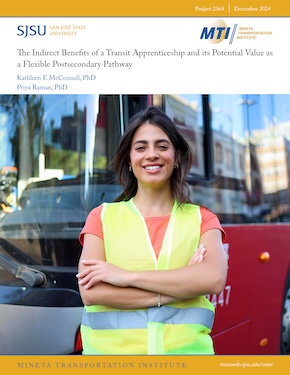- 408-924-7560
- mineta-institute@sjsu.edu
- Donate
The Indirect Benefits of a Transit Apprenticeship and its Potential Value as a Flexible Postsecondary Pathway
The transit sector has begun to embrace apprenticeships as a worthwhile training model. Apprenticeships may also address young people’s interest in career advancement opportunities, an additional benefit to the transit sector as it replaces an aging workforce and resolves other recruitment challenges. Apprenticeships that emphasize both technical and soft skills invest in career advancement by offering employees the chance to develop “cross-cutting competencies.” A highly developed model of this approach is found in the Santa Clara Valley Transportation Authority Joint Workforce Initiative (JWI), which formally recognizes skills acquisition with accredited certificates. Further development of this model would find support in initiatives to restructure postsecondary education in ways that better integrate non-degree and degree programs. Those efforts are gaining strength in response to persistent non-completion rates and declining college wealth premiums. This study contextualizes the JWI’s strengths within the revival of non-degree credentials fueled by efforts like the California Guided Pathways Program. It identifies the JWI as a good candidate for pathways that lead to a degree. Drawing on guidelines for connecting job training with degree programs, the study details the importance of affordability, portability, and articulation and outlines how these features could be further developed in the JWI.
KATHLEEN MCCONNELL, PHD
Dr. Kathleen McConnell is a professor emeritus in the Department of Communication Studies at San José State University and the past editor-in-chief of the Review of Communication. She is the author of Advocating Heightened Education: Seeing and Inventing Educational Possibilities (Lexington Press, 2020), a qualitative study that details how two alternative colleges promoted the purpose and value of a degree. She has authored numerous essays about higher education including the findings of a survey of career technical programs related to public works and public resource management. In 2021, she was selected for the inaugural City Innovate STIR Lab partnerships and paired with the City of Detroit Office of Talent Development to create a more equitable professional development system for city employees. Her experiences with program assessment, institutional reports, and strategic planning inform her research.
PRIYA RAMAN, PHD
Dr. Raman is an Associate Professor of Media and Communication at San José State University’s Department of Communication Studies with a research focus on media effects and intergroup communication. She is the current Director of Assessment and the Chair of the Accreditation Review Committee at San José State University. She is the past chair of SJSU’s Institutional Review Board and served as the Associate Research Director of the Survey Policy Research Institute (SPRI). Her research can be found in the Journal of Intercultural Communication Research, Journal of Family Communication, Howard Journal of Communications, Academic Exchange Quarterly, Communication Teacher, and Southern Journal of Communication.
-
Contact Us
San José State University One Washington Square, San Jose, CA 95192 Phone: 408-924-7560 Email: mineta-institute@sjsu.edu






